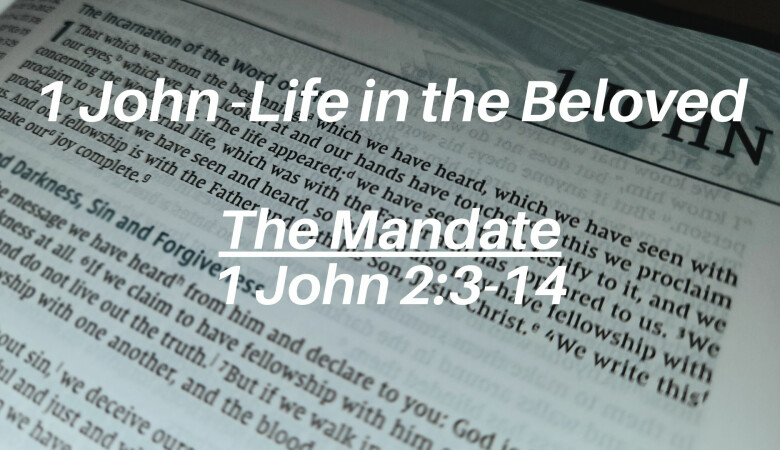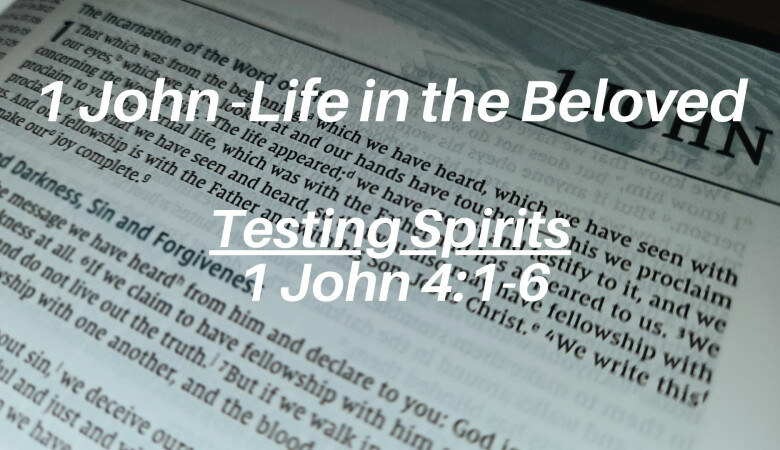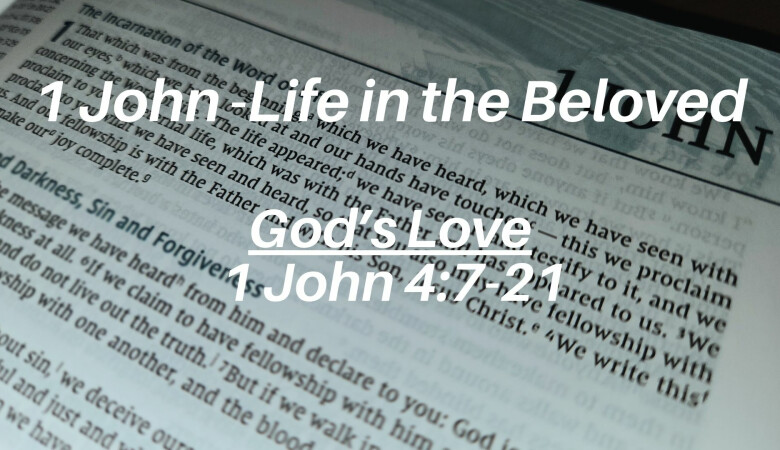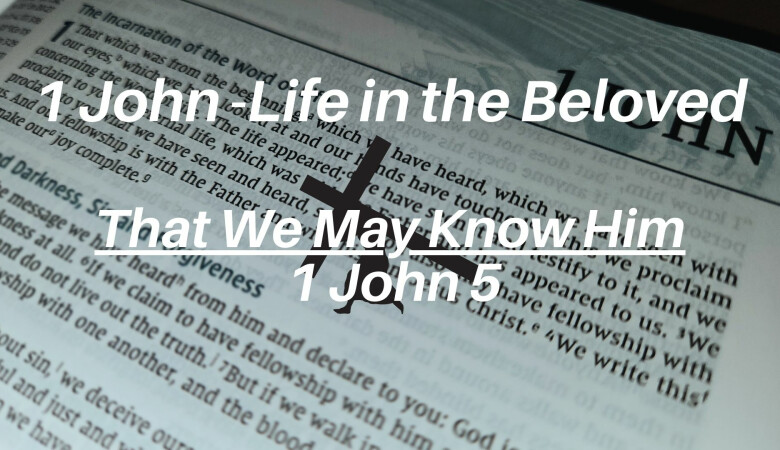Series: Life in the Beloved
God's Light, Our Darkness
September 17, 2023 | Peter Rowan
Passage: 1 John 1:5-2:2
ALL SERMONS IN SERIES
Summary
John began his first epistle by reassuring us of the truth of the incarnation of Jesus, but also told us that because of the truth of the incarnation and resurrection we have fellowship with the Father and the Son and one another. It makes all of the sense in the world then that what John has to address next is that which breaks fellowship and what we do about it. Sin breaks fellowship and our temptations with sin is to downplay them, or to deny them, or to despair over. But thanks be to God is not a liar but deals is honest about sin and what has to be done with it. Jesus is the propitiation, the atonement for our sins. He turns away the wrath of God by the gift of his own life for us who break fellowship with him and others.
Transcript
The writer Robert Fulgham tells the story of one of his professors, a man named Alexander Papaderos, who once taught Fulgham a two-week course on Greek culture. Towards the end of the last session, his teacher opened the floor for questions. Fulgham boldly asked “Dr. Papaderos, what is the meaning of life? After a few moments Papaderos pulled his wallet from his pocket, removed a tiny, quarter-sized mirror, and replied:
When I was a small child, during the war, we were very poor and lived in a remote village. One day, on the road, I found the broken piece of a mirror. A German motorcycle had been wrecked in that place.
I tried to find all the pieces and put them together, but it was not possible, so I kept only the largest piece. This one. And by scratching it on a stone, I made it round. I began to play with it as a toy and became fascinated by the fact that I could reflect light into dark places where the sun would never shine-in deep holes and crevices and dark closets. It became a game for me to get light into the most inaccessible places I could find.
I kept the little mirror, and as I went about my growing up, I would take it out in idle moments and continue the challenge of the game. As I became a man, I grew to understand that this was not just a child’s game but a metaphor for what I might do with my life. I came to understand that I am not the light or the source of light. But light-truth, understanding, knowledge-is there, and it will only shine in many dark places if I reflect it. ( Introduction by Stuart Strachan, taken from Robert Fulgham, It was on Fire when I Lay it Down.)
Now, we just read this:
5 This is the message we have heard from him and proclaim to you, that God is light, and in him is no darkness at all.
I want us to consider light, especially the light of God. But we also have to consider darkness, our darkness.
The Light of God.
One of the first things we learn in the Bible, right near the beginning of the first chapter of the first book, in Genesis 1:3 is that the first thing God makes is light. That makes sense. All of his creation reflects him, and God is light.
We heard in our Call to Worship from Psalm 104 that God is covered with light as with a garment.
God’s light is often said to be our salvation and our life.
Psalm 27 tells us “The Lord is my light and my salvation.”
Psalm 36 tells us “In your light do we see light.”
God’s words are often spoken of as light.
Proverbs 6:23 tells us “For the commandment is a lamp and the teaching a light”
Psalm 119:105 says
Your word is a lamp to my feet and a light to my path.
and 119:130
The unfolding of your words gives light.
Isaiah tells us in 49:6 that the Servant of the Lord would be given as a “light to the nations” and or course this is picked up in Luke in the Song of Simeon as he sing about the birth of Jesus.
Of course, the Gospel of John begins like this letter of John. The Word became flesh and dwelt among us (some of what he was saying in 1:1-4 of this book) and that Word is the “Light that shines in the darkness and the darkness does’t overcome that light” and “True light that enlightens everyone”.
Writing later in that Gospel in chapter 8, Jesus says “I am the light of the world. Whoever follows me will not walk in darkness, but will have the light of life.”
God is pure, he is holy, he is righteous, he is as things should be. Nothing is hidden from him and all things are revealed by him.
God is the source and the essence of truth, holiness, righteousness, goodness. In him there is nothing unholy or unrighteous or false or evil. This is how God revealed himself time and time agains and how he ultimately revealed himself in Jesus. This is also to say that he is Holy, Holly Holy. He is different. Because the rest of us want to hide.
Last week we considered how because of the very incarnation of God, because he really did take on flesh and die for us and rise again to new life for us, we have fellowship with God.
But there is a problem. Light and darkness can’t coexist. Not with the Lord. Where the Lord is there is light and his light shines in the darkness and the darkness cannot overcome it.
And one of the things I said last week is the this little powerful letter of 1 John is calling people back to the faith. They’ve grown old with some of the basics of the faith and they are either giving up on some these or just growing tired of them. And it is very clear that one of these truths that they are growing tired of is that sin is darkness and deception and God is light. Paul told us in Ephesians 5 that we “at one time [we] were darkness, but now [we] are light in the Lord. Walk as children of light 9 (for the fruit of light is found in all that is good and right and true), 10 and try to discern what is pleasing to the Lord. 11 Take no part in the unfruitful works of darkness, but instead expose them.”
I know a lot of you have been to the beach. Maybe you have been out late at night after the sun has gone down. Hopefully you brought a flashlight with you. If you were out there with a flashlight, maybe you saw as you shown that beam onto the sand, little crabs scamper away into their holes. They can’t stand the light and want to the darkness.
Friends, if we are to have fellowship with God and with one another, we have to be honest with what breaks fellowship, we have to be honest with sin. We have to be people that bring it into the light.
What is very clear throughout the Bible is that God brings light, but unfortunately what is also very very clear is that we bring darkness and a lot of times we don’t even want to acknowledge that fact and so we try to keep it in the dark.
People of Darkness
Now, I don’t really love the idea that what John is saying is that they are people of darkness, but what is going on here is he is given them some tests, some question to ask themselves that help to reveal if they are children of the light, if they have fellowship with God. And he gives them three test of darkness, which are tests of deception. These three tests here are laid out with an error that begins “If we say” and then they are followed up with the antidote to the error.
Test 1: A life marked by unrighteousness.
"If we say we have fellowship with him while we walk in darkness, we lie and do not practice the truth."
Alright, you need to hear this: he did not just say, “if we say we have fellowship with him and then we sin, we lie and do not practice the truth.” He is saying that if your life is marked by darkness yet you claim to be in fellowship with God, you are lying.
“Truth in the inward being” - Pslam 51 tells us is what God desires. He desires a heart that is changed and that always results in a life that is changed. That doesn’t result in a life that is perfect, but if we make a life of sin and rebellion against God our normal way of life, the way that we walk in, well, shouldn’t it just be obvious that we really don’t want fellowship with the holy and righteous one?
John 11:9-10 - “If anyone walks in the day, he does not stumble, because he sees the light of this world. 10 But if anyone walks in the night, he stumbles, because the light is not in him.”
Let me give you this questions as a diagnostic: Is there something that you just never want to bring before God or others that you keep on doing or keep on thinking? Is there are sin that you just keep practicing and others have called you out on it and every time you read about it in the Bible you don’t really want to acknowledge it because you want to keep on practicing it?
Well, John gives us an antidote.
“But if we walk in the light, as he is in the light, we have fellowship with one another, and the blood of Jesus his Son cleanses us from all sin.” Bring it out to the light. Once you do you will start walking in the light and fellowship will grow and, after all, your sin doesn’t define you. Jesus died for you.
Test 2: Sin is no longer relevant.
“If we say we have no sin, we deceive ourselves, and the truth is not in us”.
In some ways I would say that this is a temptation of good preaching. I mean, John Just said “the blood of Jesus cleanses us from all sin.” Well, then it is easy to say, “we have no sin. We have moved beyond the idea of good and evil. Why even talk about sin?!” Or, why come in here every week and have a time of confession? Didn’t we hear last week and the week before that Jesus forgives us and that our sin is not who we are and it is all washed away? Why are we even talking about this?”
What is happening here is that some people believe that they have got to the point where talking about sin and confessing it to God and one another just isn’t relevant. But John says that the truth is not in these people. And in John 8:44 it is said of the devil that “the truth is not in him.” “Did God really say you shall not eat of the fruit of the tree? Don’t worry about it. You won’t die. Sin is not really an issue to deal with.
But the antidote to this is confession. Regular confession. Confess your sins. He is faithful and just to forgive us our sins and to cleanse us from all unrighteousness. Take time to contemplate your sin. Not to abide in it. But don’t ever diminish it’s ugliness and its harm. Acknowledge it. Don’t brush it aside. Confess it. He always forgives you.
Test 3: Denies God’s revelation.
"10 If we say we have not sinned, we make him a liar, and his word is not in us."
This is pretty similar to test 1, but there we were deceiving ourselves (the truth is not in us) and here we are specifically making God a liar (his word is not in us). To say you haven’t sinned is to say that God’s revelation in holy scripture is just false. If you want to say that we need to stop making an issue of sin, then you are going against the consistent testimony of God in the Bible. The honest person when they are confronted with the holiness of God says “I am a sinner!”
But the antidote to this lie that God’s revelation of the gravity of sin in Scripture is really to look at the revelation of God in Christ. So, chapter 2:1-2 “My little children, I am writing these things to you so that you may not sin. But if anyone does sin, we have an advocate with the Father, Jesus Christ the righteous. 2 He is the propitiation for our sins, and not for ours only but also for the sins of the whole world.”
The antidote to the problem of diminishing sin is looking upon Jesus on the cross. You see, each of these tests that John is giving us is speaking to a temptation to diminish sin. We walk in it because it’s not a big deal. We say we don’t have it because we have been enlightened beyond the categories of good and evil. We say we have not sinned because we know better than the Bible. You see, all of these make sin out to just not be a big deal. But if Jesus is the revelation of God, if he is the true light in the darkness, and when he came in the flesh he became the propitiation for our sin - which is to say that he satisfied the wrath of God against sin - this is what you sin demanded of Jesus! well, if your sin a big deal? Yeah it is. But is God’s grace even more lovely? Yes, it is!
Some of you have read Tish Harrison Warren’s beautiful little book Prayer in the Night. In that book she talks about this aphorism that was common in the medieval church: per crucem ad lucem. Through the cross to the light. She says, “God’s love is refracted through the cross, which often makes it hard to see or recognize. But if we are to learn to trust—to place the weight of our lives on the love of God—we can only learn this through the cross.” In the cross you see the weight of your sin. There is no brushing off sin if you look at the cross. The Light of God burned out for you. But if you look at the cross and the resurrection, you will see that your sin was conquered. The Light went to the darkest places and overcame it. If you acknowledge the weight of your sin, the gravity of your sin, the ugliness of your sin, if you bring it into the light, you will be surprised that far from killing you light the crab that is scampering into whole thinks, you will have life. You will have fellowship with God and with one another. The world will be more beautiful because you’ve let that light shine down into the cracks and crevasses and bring truth and beauty and goodness.
Let me say one last thing and this really is at the heart of a God who is light, who make light at the beginning and who is bringing his light to the world.
It seems that Jesus was writing to Christians who thought, like a lot do today, that Jesus was just the remedy for their problems, for their sin and for their alone. John says, “not one bit!” As NT Wright says, “Just as God didn’t remain content to be in fellowship only with his own son, but wanted to extend the fellowship (of the trinity) to all those who met and flooded Jesus; and just as John is writing this letter so that its’ readers may come to share intuit same divine fellowship; so now all who know themselves to be forgiven through Jesus death must look, not at their own privilege, but at the wider task. God intends to call more and more people into his fellowship.”
God made his light to shine into the world at the beginning. He shone the brightness of his light in Christ. Will he shine it through you?
God’s desire is to have his light shine in all places.
Series Information

The book of 1 John is a letter from the last remaining apostle to group of house churches he oversees near Ephesus. It is a message of encouragement to saints who have grown weary with the unbelief of those around them. John writes to them and us as one who has known and been known by Jesus - and has found Jesus to be full of light, kindness and love.







